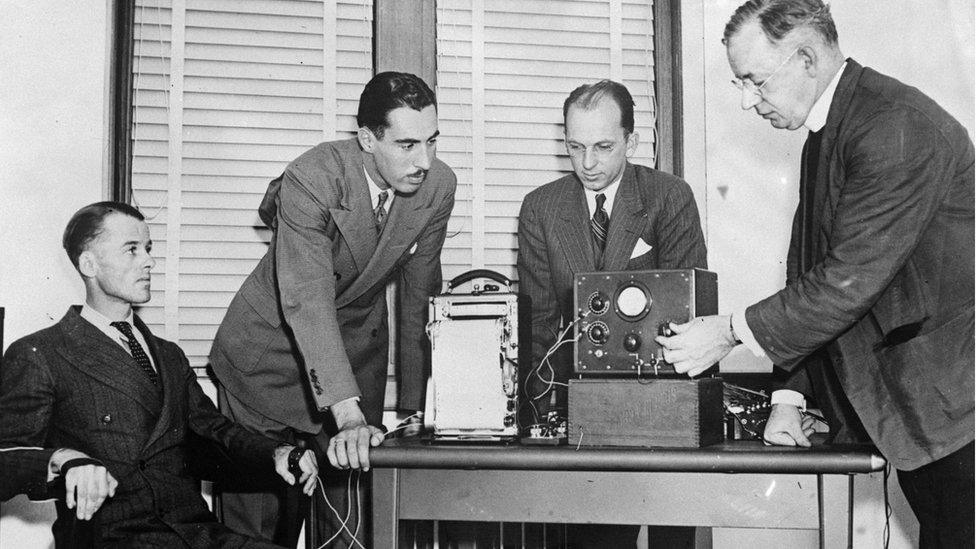Why can it take so long before starting your new job?
- Published

Contractors sometimes have to wait weeks before they can start the job they've been offered
Great news - you've been offered the contract. Kerching. Now you just need to be vetted by your new employer.
They want to check you're not a terrorist, bankrupt, serial killer… that sort of thing. Shouldn't take long - you're none of those, last time you checked.
But weeks later, you're still waiting for a start date. And all that time you may not have been earning, putting off other jobs in the interim.
Such delays could cost you hundreds, if not thousands, in lost income.
If this scenario sounds familiar, you're one of many self-employed professionals getting stuck in the bureaucratic mire of "onboarding" - the process of vetting people before they can start work.
"It can take two or three weeks for a recruiter to find a suitable candidate then perhaps the same time again to go through all the background checks - it's the grit in the machine," says Simon Bichara, founder of HiredByMe, external, a firm aiming to address this issue.
These checks can include criminal record, bankruptcies, credit record, and getting to the bottom of any career gaps in your curriculum vitae (CV) or resume.

Simon Bichara hopes his start-up, HiredByMe, can speed up recruitment checks
So HiredByMe spent more than two years developing a way to streamline the process, effectively carrying out all the pre-employment screening (PES) checks in advance to create a kind of portable ID that contractors can take with them from job to job.
This entailed studying the screening requirements of more than 50 businesses, coming up with a single standard that would satisfy them all, and finding ways to access all the data they needed to as quickly as possible, says Mr Bichara.
It was "a difficult problem to solve".
While there is a lot of technology going on in the background, the major challenge was "convincing employers and recruiters to trust our system," he says.

HiredByMe also offers a cloud-based document store for all your relevant certificates
HiredByMe says its portable PES passport helps cut job start delays by five-to-seven business days, reducing workloads for recruiters and helping contractors start new jobs earlier, thereby increasing their earning potential.
"Our research shows that around £1.2bn ($1.5bn) of productive capacity is lost in the UK every year through delays in this process," says Mr Bichara, "and in the financial services industry around £180m is lost every year."
Blackmail threat
Samantha Hurley is operations director for the Association of Professional Staffing Companies (Apsco), whose clients specialise in recruiting white-collar professionals. She says: "In the finance sector - banking and insurance - they have to be extremely careful about the people they're taking on, and those checks can be very onerous.
"If a new employee has money problems, for example, it could leave them open to blackmail."
In the education and social work sectors, where safeguarding children is a priority, carrying out checks on prospective recruits can cost "about £200 per candidate", she says.

Ideally, contractors would finish one job and be able to start a new one immediately
So could a service like HiredByMe help?
"I imagine their data protection policy is going to have to be pretty robust for contractors to trust them," says Ms Hurley.
"But giving all your data to one firm seems an attractive proposition, because a lot of contractors don't like giving private information away to many different recruitment firms.
"So it does seem like a good idea."
Simon Bichara emphasises this point, saying that contractors who pay for the HiredByMe service get to see all the data that is held on them, whereas they don't usually see the data recruitment firms have dug up. They can also use the service as a cloud-based store for all the documents and certificates they need to apply for jobs.

Wouldn't it be great if we didn't have to fill in paper forms each time we applied for a job?
But will they be prepared to stump up £200 for the portable PES and the £99 top-up fees each time the report has to be updated?
Since its launch in September, HiredByMe has focused on the financial services sector and has signed up nearly 40 recruitment firms and "a few hundred contractors", says Mr Bichara.
The aim is to expand to other sectors, such as healthcare, education, government and telecoms.
Telling porkies
Verifying whether job applicants are telling the truth is a huge headache for recruiters and human resources departments.
Around 100,000 UK workers had lied about their qualifications on their CVs, a recent survey by best practice qualifications firm Axelos, external suggested.
And checking references may not reveal the truth about such exaggerated claims either.

There must be an easier way to tell if job applicants are telling the truth?
One solution is to issue digital badges like those operated by Acclaim, external in partnership with major brands, such as IBM, Autodesk and Adobe. These prove that employees achieved the certifications they said they did and can be verified easily online, speeding up the "onboarding" process.
The digital badges can be embedded or attached to CVs making it easier for recruiters to verify that you're telling the truth.
Another is to use specialist vetting firms, such as Candidate Vetting, external.
Digitising a traditionally paper-based industry is another way to save time - and create a digital audit trail of someone's career. Scanned versions of certificates and online application forms are preferable to snail mail and pen and paper.
Gig economy
As self-employment continues to grow worldwide in the era of the "gig economy", this onboarding issue is likely to grow in importance, says Andy Chamberlain, deputy director of policy at Ipse, an association for freelancers, consultants and contractors.
There are nearly five million self-employed people in the UK and 15 million in the US - and the numbers continue to rise.

Freelancer frustration: "Why is all this taking so long?"
"As more people become more dependent on piecemeal work, recruitment delays that stop people working could be very problematic for them and the economy as a whole," says Mr Chamberlain.
While digitisation, automation and machine learning have been transforming the recruitment industry - more efficiently matching job vacancies with suitable candidates - there is a limit to how much technology can help with the onboarding part of the process, Mr Chamberlain believes.
"While digital platforms can shave off bits of time here and there, you still need real live people to handle many aspects of the vetting process," he says.
"You wouldn't want to leave high-level security clearance to an algorithm."